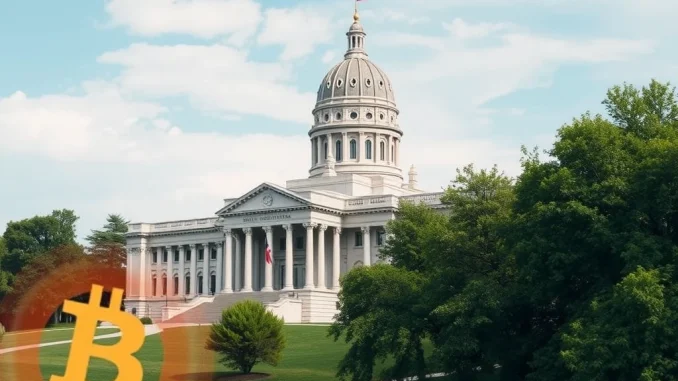
Get ready, Michigan! The state legislature is making waves in the digital asset space. Recently, four significant Michigan crypto bills were introduced in the House, signaling a proactive approach to integrating and regulating cryptocurrencies within the state’s framework. This legislative push covers everything from potential Bitcoin investment for public funds to discouraging a central bank digital currency and even leveraging Bitcoin mining Michigan for environmental benefit.
What Are These Bold Michigan Crypto Bills About?
According to reports, the Michigan House of Representatives has put forward a package of four distinct bills aimed at addressing various facets of the cryptocurrency and blockchain landscape. These proposals reflect a growing recognition among state policymakers of the increasing importance and potential impact of digital assets.
Here’s a quick look at the core of each bill:
- House Bill 4510: Focuses on allowing public pension funds to gain exposure to Bitcoin.
- House Bill 4511: Aims to prevent state agencies from supporting a U.S. Central Bank Digital Currency (CBDC).
- House Bill 4512 & 4513: Designed to encourage and incentivize Bitcoin mining operations tied to environmental recovery efforts.
These bills collectively paint a picture of a state legislature considering both the economic opportunities and potential risks associated with digital currencies.
Opening Doors: Bitcoin Investment for Public Pensions
House Bill 4510 is particularly noteworthy as it addresses the possibility of public pension funds investing in Bitcoin. This is a significant step, as public pension funds typically have conservative investment mandates aimed at long-term stability and growth for retirees.
The bill proposes allowing these funds to invest in Bitcoin specifically through regulated exchange-traded products (ETPs). This means the investment wouldn’t be in physical Bitcoin held directly by the pension fund, but rather in a financial product traded on a regulated exchange that tracks Bitcoin’s price. This approach is often seen as a safer, more accessible way for traditional institutions to gain exposure to volatile assets like Bitcoin.
However, the bill includes a crucial safeguard: the asset (Bitcoin) must have maintained an average market capitalization of at least $250 billion over the preceding year. This threshold aims to ensure that only established, large-cap cryptocurrencies with a degree of market maturity are considered for such investments.
Why is this significant?
- Potential Diversification: Bitcoin offers low correlation with traditional assets like stocks and bonds, potentially providing diversification benefits to a pension portfolio.
- Growth Opportunity: Proponents argue that even a small allocation could offer significant growth potential over the long term, helping pension funds meet their future obligations.
- Institutional Acceptance: Allowing public funds to invest, even indirectly, through regulated products, signals increasing mainstream acceptance of Bitcoin as an asset class.
This move mirrors discussions happening in other states and at the federal level regarding institutional Bitcoin investment, highlighting a national trend towards considering digital assets for broader investment strategies.
Drawing a Line: CBDC Prohibition in Michigan
In contrast to the openness towards Bitcoin, House Bill 4511 takes a cautious, perhaps even prohibitive, stance on a potential U.S. Central Bank Digital Currency (CBDC). The bill seeks to prohibit state agencies from supporting or promoting a U.S. CBDC.
A CBDC is a digital form of a country’s fiat currency, issued and controlled by the central bank. While proponents argue it could modernize payment systems and increase financial inclusion, critics raise concerns about privacy, government surveillance, and the potential impact on commercial banks.
Michigan’s proposed CBDC prohibition aligns with similar legislative efforts and executive orders seen in other states (like Florida and North Carolina) that express skepticism or opposition to a federal CBDC. This resistance often stems from:
- Privacy Concerns: Fears that a government-controlled digital currency could allow for excessive tracking of citizens’ transactions.
- Scope of Federal Power: Questions about whether the Federal Reserve has the legal authority to issue a CBDC without explicit congressional approval.
- Impact on Banking: Worries that a CBDC could disintermediate traditional banks.
By seeking to prevent state agencies from supporting a CBDC, Michigan lawmakers are sending a clear message about their reservations regarding this form of digital currency, distinguishing it sharply from decentralized cryptocurrencies like Bitcoin.
Turning Waste into Value: Bitcoin Mining Michigan
Perhaps the most innovative aspect of the legislative package comes from House Bills 4512 and 4513. These bills focus on encouraging Bitcoin mining Michigan, specifically by linking it to environmental recovery efforts at abandoned oil wells.
Abandoned oil and gas wells can pose environmental problems, including leaking methane gas, a potent greenhouse gas. Flaring (burning off) this gas is common but still releases carbon dioxide. Utilizing this otherwise wasted energy source to power energy-intensive processes like Bitcoin mining presents a potential solution.
The bills propose offering tax incentives to companies that set up Bitcoin mining operations at these abandoned well sites. The idea is that the economic activity generated by mining can help fund the environmental cleanup and capping of the wells, turning a liability into an asset.
Benefits of this approach:
- Environmental Cleanup: Provides economic motivation to address environmental issues left by abandoned infrastructure.
- Waste Energy Utilization: Captures and uses methane that would otherwise be released or flared.
- Economic Development: Creates jobs and economic activity in potentially underserved areas.
- Supports Bitcoin Network: Adds more hashing power to the decentralized Bitcoin network, potentially using renewable or otherwise wasted energy.
This approach to Bitcoin mining Michigan highlights how the energy needs of cryptocurrency mining can potentially be aligned with environmental goals and resource optimization, moving beyond traditional energy sources.
The Broader Context: State Crypto Regulation in the US
Michigan’s legislative package is not happening in a vacuum. Across the United States, states are increasingly taking the lead in defining how cryptocurrencies and blockchain technology will operate within their borders. While federal regulation is still evolving, states are enacting laws covering everything from licensing crypto businesses to defining property rights for digital assets and, as seen here, influencing investment and energy policy.
This state-level activity reflects a diverse set of approaches to State crypto regulation:
- Some states are adopting comprehensive regulatory frameworks (like New York’s BitLicense, though often criticized).
- Others are focusing on specific aspects, such as consumer protection, tax treatment, or encouraging blockchain adoption.
- Several states are actively trying to attract Bitcoin mining operations, often highlighting favorable energy policies or resources, much like Michigan is proposing but with an environmental angle.
- Opposition to a federal CBDC is a growing bipartisan issue at the state level.
The Michigan bills demonstrate a multi-faceted approach within a single state, addressing investment, monetary policy, and environmental/energy concerns through the lens of digital assets. This package positions Michigan as a state actively engaging with the complexities of the digital economy and considering tailored solutions for its unique industrial and environmental landscape.
Conclusion: Michigan’s Step Towards a Digital Future
The introduction of these four Michigan crypto bills marks a significant moment for the state’s engagement with digital assets. From potentially allowing public pension funds to access Bitcoin investment through regulated channels, to drawing a firm line against a U.S. CBDC with the proposed CBDC prohibition, and fostering innovative Bitcoin mining Michigan solutions tied to environmental cleanup, the proposals are comprehensive and forward-thinking.
While these bills still need to navigate the legislative process, they clearly indicate Michigan’s intent to actively participate in shaping the future of digital asset adoption and State crypto regulation. The outcomes of these proposals could set precedents and offer valuable insights for other states grappling with similar questions about integrating cryptocurrencies into traditional financial and environmental frameworks.
Keep an eye on Lansing as these bills progress – they could pave the way for new opportunities and regulatory clarity in the Great Lakes State.



